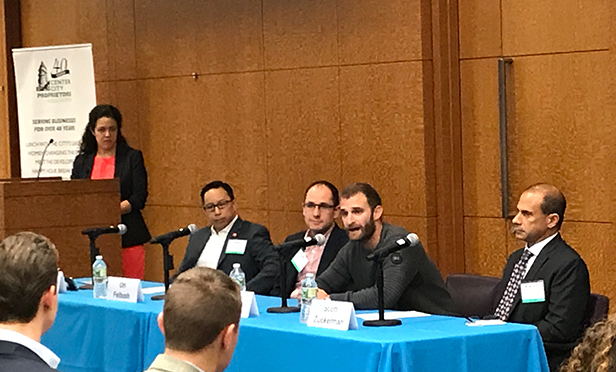 CRE panelists at the Center City Proprietors Association seminar, Philadelphia today, from left: Moderator Lauren Gilchrist of JLL; John Chin, Philadelphia Chinatown Development Corporation; Ori Feibush, OCF Realty; Aaron Smith, MMPartners; B. Scott Zuckerman, Domus
CRE panelists at the Center City Proprietors Association seminar, Philadelphia today, from left: Moderator Lauren Gilchrist of JLL; John Chin, Philadelphia Chinatown Development Corporation; Ori Feibush, OCF Realty; Aaron Smith, MMPartners; B. Scott Zuckerman, Domus
PHILADELPHIA, PA—Although 66% of Federal Reserve economists think it's likely that a “correction or downturn” in the economy will start some time around 2020, Philadelphia commercial real estate developers think there's still lots of running room for virtually all sectors in the market, but they admit that affordable housing projects will face financial challenges because of the high cost of construction here.
The Center City Proprietors' Association hosted a panel to discuss the real estate economy at the headquarters of PECO, Philadelphia's largest electric utility.
“The important thing to note is that the cycle is very long in the tooth at this stage,” says Lauren Gilchrist, senior vice president and senior director of research at Jones Lang LaSalle, who moderated the panel. She says the early warning gives developers time to prepare. She thinks that the low level of unemployment is a warning sign.
“I think one of the number one influencing factors right now across all asset classes in the country around real estate is the fact that employers are really struggling to find talent,” Gilchrist says. “Unemployment is about 3.7 %, unemployment for people with a bachelor's or more is about 2.2%. This is far beyond the conditions of an equilibrium in the labor market overall.”
Nevertheless, she thinks Philadelphia lags the national trends by 2-3 quarters, so provides a more stable business environment for the industry and investors. In fact, she says the city is starting to attract a fairly significant chunk of offshore capital to the real estate market here.
“At this stage that capital is looking for new places to go,” she says. “Philadelphia has certainly benefited from that over the course of the past two to three years. Most of the office trades up and down Market Street that you've seen—1600 Market, Duane Morris, 2000 Market, down in the Navy Yard, at the GSK headquarters—all of those trades have occurred with international as the equity partner on the deal, which is really significant for Philadelphia, because most of the real high highs in other markets are a function of foreign capital looking for a place to park itself.”
PODCAST PROGRAM
You can listen a podcast of the complete CCPA Commercial Real Estate panel in the player below. If you do not see a player, you can click here to listen to the podcast.
Panelists agreed that high construction costs and regulatory requirements for environmental sustainability and other design factors make affordable housing other than rental properties all but, well, unaffordable.
“They're actually driving up the cost of the affordable housing,” says B. Scott Zuckerman, principal of Domus, a Philadelphia-based general contractor. Current standards suggest that it could cost $20 million dollars to build 60 affordable units, he says. “The overall costs for affordable housing projects on a four-story building run somewhere between $225-$250 dollars a square foot, which means that on a per-unit basis, costs are somewhere around $250,000 to $300,000. I don't know who really builds affordable housing when it cost three hundred thousand dollars a unit to actually build it.”
“We are a city that has to deal with displacement and we have to figure out gentrification,” says John W. Chin, executive director of Philadelphia Chinatown Development Corporation. “I think if we can all work together, we can look at a policy to continue to develop the city of Philadelphia and ensure that all boats rise.”
The federal Opportunity Zone program offers important opportunities in the 82 designated Philadelphia census tracts, says Gilchrist.
Chin says PCDC is looking at structuring an opportunity fund to attract development money into Chinatown.
“That's a tremendous opportunity to bring investment into neighborhoods like Chinatown, and from our perspective as a nonprofit with a social mission, it's a perfect opportunity to use investment to deliver a product and development that serves people at all income levels,” he says.
“If you were to draw a map of every single project that our office involved with you will perfectly carve out every area that's not enough to zone including every single thing we're working on one of the poorest neighborhoods in the city,” says Ori C. Feibush, president and founder of OCF Realty. “We're certainly actively looking at them, but haven't found any that check off every box that we'll be required to check off, including a portion of the south side of Washington Avenue which is incredibly ripe for development and decades behind where it should be. The politics far outweigh the benefits that you'd get from participating in opportunities.”
“I think probably 80% of what we do is in an opportunity zone,” says Aaron Smith, founding member/partner in MMPartners, a residential and commercial development firm. It's certainly a hot-buzz topic right now.”
© Touchpoint Markets, All Rights Reserved. Request academic re-use from www.copyright.com. All other uses, submit a request to [email protected]. For more inforrmation visit Asset & Logo Licensing.







